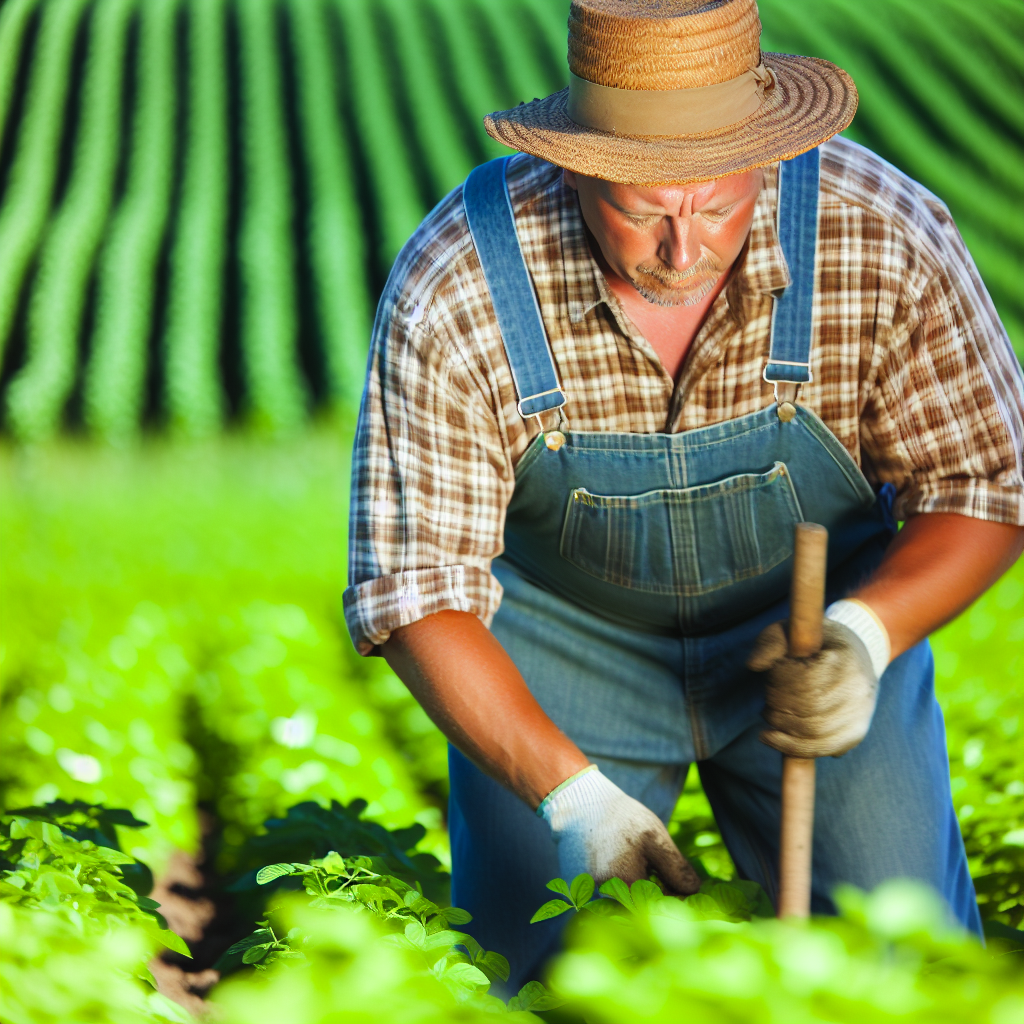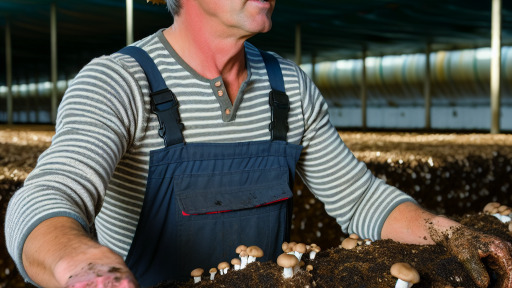Reduction of Chemical Pesticides and Fertilizers
Minimizing Chemical Use
Organic farming significantly reduces the reliance on chemical pesticides.
This practice helps protect local ecosystems.
Farmers use natural alternatives instead of synthetic chemicals.
For example, neem oil and diatomaceous earth are safe options.
Additionally, crop rotation improves soil health without chemicals.
Thus, organic farming fosters a healthier agricultural environment.
Enhancing Soil Health
Organic methods enrich the soil naturally.
Composting provides essential nutrients for crops.
This eliminates the need for chemical fertilizers.
Healthy soil retains moisture and supports diverse microorganisms.
Consequently, it requires less irrigation in the long run.
Reducing Water Pollution
Minimizing chemical inputs prevents water contamination.
Pesticides and fertilizers often run off into nearby water bodies.
Organic practices mitigate this risk significantly.
Moreover, they promote cleaner, safer drinking water for communities.
Transform Your Agribusiness
Unlock your farm's potential with expert advice tailored to your needs. Get actionable steps that drive real results.
Get StartedIn turn, this enhances wildlife habitats in those areas.
Supporting Biodiversity
Organic farming practices support a rich variety of species.
By avoiding harmful chemicals, farmers protect beneficial insects.
This includes pollinators, which are essential for crop production.
Healthy ecosystems provide natural pest control.
As a result, organic farms often boast higher biodiversity levels.
Improvement of Soil Health and Biodiversity
Enhancing Soil Quality
Organic farming significantly improves soil health.
This approach focuses on natural processes instead of chemical inputs.
Soil structure becomes more robust under organic practices.
Diverse cropping patterns replenish nutrients regularly.
Earthworms and beneficial microbes thrive in organic soils.
As a result, soil retains moisture more effectively.
Farmers observe decreased erosion levels over time.
Increasing Biodiversity
Organic farming fosters greater biodiversity on farms.
Polyculture systems replace monocultures, encouraging diverse species.
This increased variety attracts pollinators and natural pest controllers.
Birds, insects, and other wildlife benefit from enriched habitats.
Ultimately, this diversity strengthens the ecosystem’s resilience.
Reducing Chemical Dependence
Transitioning to organic farming reduces reliance on synthetic chemicals.
Farmers utilize natural alternatives for pest control and fertilization.
This minimizes harmful runoff into surrounding environments.
Consequently, local water sources remain cleaner and healthier.
Building Sustainable Practices
Organic farming promotes sustainable agricultural practices.
Crop rotations and cover crops enhance soil fertility sustainably.
Showcase Your Farming Business
Publish your professional farming services profile on our blog for a one-time fee of $200 and reach a dedicated audience of farmers and agribusiness owners.
Publish Your ProfileBy embracing these methods, farmers combat climate change.
They also contribute positively to their local environments.
Long-term sustainability becomes achievable through these efforts.
Mitigation of Climate Change Effects
Reducing Greenhouse Gas Emissions
Organic farming significantly lowers greenhouse gas emissions.
This method reduces the reliance on synthetic fertilizers.
Consequently, it minimizes nitrous oxide emissions, a potent greenhouse gas.
Additionally, organic practices enhance soil carbon sequestration.
Healthy soils store more carbon than degraded ones.
Thus, farmers actively work to combat climate change.
Enhancing Resilience to Climate Variability
Organic farming promotes biodiversity, which boosts ecosystem resilience.
Diverse crops can better withstand extreme weather events.
Moreover, organic farmers use crop rotations to diversify yields.
This strategy reduces vulnerability to pests and diseases.
As a result, farmers maintain productivity even during climate fluctuations.
Conserving Water Resources
Organic practices significantly improve water retention in soils.
Healthy soil structure helps retain moisture during dry periods.
This leads to less water being used for irrigation.
Furthermore, organic farming often relies on rainwater harvesting techniques.
Such methods help sustain agricultural productivity with less water.
Supporting Local Ecosystems
Organic farming nurtures local ecosystems and wildlife habitats.
By avoiding harmful pesticides, farmers protect beneficial insects.
This encourages the presence of natural pest predators.
In turn, these practices sustain pollinator populations, critical for overall biodiversity.
Consequently, organic farms contribute to healthier local environments.
Delve into the Subject: Perennial Vegetables for Edible Landscapes
Conservation of Water Resources
Importance of Water Conservation
Water is a vital resource for all life forms.
Conserving water helps sustain agricultural systems.
Organic farming plays a significant role in reducing water consumption.
Additionally, it promotes the efficient use of available water resources.
Methods to Conserve Water in Organic Farming
Organic farmers utilize various methods to conserve water effectively.
- They implement drip irrigation systems to minimize wastage.
- Cover crops improve soil moisture retention.
- Mulching reduces evaporation rates from the soil surface.
- Crop rotation enhances the soil’s water-holding capacity.
Benefits of Water Conservation Practices
Conserving water leads to healthier crops.
It reduces the reliance on groundwater sources.
Moreover, it protects local ecosystems and wildlife habitats.
This practice also helps farmers save money on water bills.
Long-term Implications
Water conservation in organic farming has long-term benefits.
It ensures a sustainable future for agriculture.
Furthermore, it contributes to the resilience of farming systems.
Organic practices promote better water management for future generations.
Delve into the Subject: Setting Up A Sustainable Container Farm
Promotion of Sustainable Land Management Practices
Enhancing Soil Health
Organic farming utilizes natural methods to improve soil health.
Showcase Your Farming Business
Publish your professional farming services profile on our blog for a one-time fee of $200 and reach a dedicated audience of farmers and agribusiness owners.
Publish Your ProfilePractices include crop rotation and cover cropping.
These techniques enhance soil fertility and structure.
As a result, farmers achieve better water retention.
Healthy soil supports diverse microbial life.
Reducing Chemical Use
Organic farming minimizes reliance on synthetic chemicals.
This leads to reduced chemical runoff into water systems.
Consequently, it promotes cleaner drinking water for communities.
Farmers also use organic fertilizers that sustain soil nutrients.
These practices contribute to a healthier ecosystem overall.
Encouraging Biodiversity
Organic farming supports various plant and animal species.
Diverse crops create habitats for pollinators and beneficial insects.
Crop diversity reduces vulnerability to pests and diseases.
Farmers often plant native species that enhance local biodiversity.
Biodiverse farms are more resilient to climate change impacts.
Conserving Water Resources
Sustainable practices promote efficient water usage in agriculture.
Organic farming often employs drip irrigation methods.
These techniques minimize water waste and runoff.
Moreover, improved soil health enhances groundwater recharge.
Consequently, organic farms can effectively withstand drought conditions.
Reducing Erosion
Organic farming methods help prevent soil erosion.
Cover crops, mulching, and reduced tillage practices are vital.
These techniques protect the soil from wind and water erosion.
Healthy soil structure maintains nutrient-rich topsoil.
In turn, this supports sustainable agricultural productivity.
Learn More: Cost-Effective Methods for Mushroom Production

Enhancement of Wildlife Habitat and Ecosystems
Promoting Biodiversity
Organic farming enhances biodiversity in agricultural landscapes.
This method fosters a variety of plants, insects, and animals.
As a result, it creates a more resilient ecosystem.
Farmers often introduce native species to support local wildlife.
Increased plant diversity attracts beneficial insects and pollinators.
Soil Health Improvement
Organic farming practices improve soil health and structure.
Healthy soil supports diverse microbial life and plants.
This diversity is crucial for maintaining ecosystem balance.
Furthermore, it promotes water retention, reducing erosion.
Healthy soils foster a vibrant environment for wildlife habitats.
Natural Pest Control
Organic methods reduce reliance on synthetic pesticides.
This change allows beneficial predators to thrive.
Predators, such as ladybugs and lacewings, naturally control pests.
Consequently, organic farming creates safer habitats for wildlife.
It leads to healthier ecosystems with reduced chemical exposure.
Showcase Your Farming Business
Publish your professional farming services profile on our blog for a one-time fee of $200 and reach a dedicated audience of farmers and agribusiness owners.
Publish Your ProfileWater Conservation
Organic farming emphasizes sustainable water management practices.
Techniques like crop rotation and cover cropping enhance water retention.
These practices minimize runoff and soil degradation.
Moreover, they reduce the risk of water contamination.
Healthy water systems support diverse aquatic ecosystems.
Creating Buffer Zones
Farmers often establish buffer zones around fields to protect ecosystems.
These areas provide shelter for various species and improve habitat connectivity.
Buffer zones also filter pollutants before reaching natural waterways.
Wildflowers and native grasses in these zones support pollinators.
This strategy integrates agriculture with natural habitat conservation.
Uncover the Details: Soil Management In Urban Gardening
Support for Local Food Systems and Communities
Strengthening Local Economies
Organic farming boosts local economies by keeping money within the community.
Farmers markets create direct connections between consumers and producers.
As a result, this strengthens neighborhood bonds and support networks.
Many local businesses benefit from buying organic produce and goods.
This ultimately leads to job creation and economic diversity.
Enhancing Food Security
Organic farming increases food security in local communities.
By growing food locally, communities reduce reliance on long supply chains.
This ensures access to fresh, nutritious food.
Moreover, it minimizes the risk of food shortages and price inflation.
Building Community Resilience
Organic farming practices foster community resilience against climate change.
Farmers use sustainable methods to enhance soil health and biodiversity.
This adaptability helps communities respond to environmental challenges.
Local production also allows for faster recovery after adverse events.
Promoting Healthy Lifestyles
Access to organic produce encourages healthier eating habits.
Communities benefit from educational programs around nutrition.
Farm-to-table initiatives connect people with their food sources.
This promotes awareness of agricultural practices and healthy choices.
Empowering Communities Through Education
Organic farming promotes educational opportunities for all age groups.
Workshops and farm visits enhance understanding of sustainable practices.
Local schools often participate in gardening programs with organic farms.
This empowers the next generation with knowledge of food systems.
Participatory Decision-Making
Organic farmers often engage with local communities in decision-making processes.
This ensures that agricultural practices meet local needs and values.
Collective planning strengthens relationships among farmers and residents.
Such involvement fosters community pride and ownership.
Reduction of Pollution and Soil Erosion
Minimizing Chemical Inputs
Organic farming significantly reduces the use of chemical fertilizers and pesticides.
This practice directly decreases the levels of harmful substances in the soil.
As a result, it promotes healthier ecosystems around agricultural areas.
Farmers often utilize natural alternatives, such as compost and biological pest control.
Showcase Your Farming Business
Publish your professional farming services profile on our blog for a one-time fee of $200 and reach a dedicated audience of farmers and agribusiness owners.
Publish Your ProfileThese alternatives not only reduce pollution but also improve soil quality.
Enhancing Soil Health
Organic farming practices focus on enhancing soil health through natural methods.
Crop rotation and cover cropping are common techniques that protect the soil.
These methods prevent erosion by maintaining soil structure and fertility.
Additionally, organic farmers add organic matter to improve soil biodiversity.
Thus, the soil retains moisture better, which further contributes to sustainability.
Promoting Biodiversity
Organic farms encourage diverse plant and animal species on the land.
This biodiversity helps create a balanced ecosystem that fights pests naturally.
Moreover, varied crops support pollinators which are crucial for food production.
Healthy ecosystems reduce the need for synthetic chemicals, lowering pollution levels.
Furthermore, diverse habitats foster resilience against environmental changes.
Reducing Water Pollution
By avoiding chemical runoff, organic farming protects local water sources.
This approach ensures cleaner water for both wildlife and human consumption.
Healthy soil absorbs water better, minimizing erosion and surface runoff.
The use of buffer zones along waterways is common in organic practices.
These zones act as filters, trapping pollutants before they enter waterways.
Additional Resources
The Three Sisters of Indigenous American Agriculture | National …




